Money
Birgunj receives 2,500 tonnes of urea
As farmers rush to plant their winter crops with the chill setting in, several districts across the country are reporting shortages of chemical fertiliser, particularly urea.
Shankar Acharya
Nearly 2,500 tonnes of urea purchased by Nepal’s Krishi Samagri Company for winter crops arrived in Raxaul, India on Thursday.
“A railway rack carrying 2,500 tonnes of urea arrived at Raxaul railway station on Thursday,” said Alok Kumar, information officer of the company’s regional office in Birgunj. “The fertiliser will be brought to the depot after completing a lab test.”
The fertiliser was supplied by Indian Potash Limited, also known as IPL, a fertiliser company based in India.
The company was awarded the bid to supply 30,000 tonnes of urea.
The Indian company bought the fertiliser from Oman, according to Kumar.
This is the fourth consignment of the contract. “With this, we have received 10,000 tonnes from the company. The remaining fertiliser will arrive in the country in the next one and a half weeks,” he said.
Nepali farmers had to suffer in the monsoon after the government failed to supply adequate fertilisers in the peak paddy transplantation period. Officials say that Nepal may see a reduced output due to a severe fertiliser shortage. The harvest has already started.
As farmers rush to plant their winter crops—wheat, maize, mustard and pulses—with the chill setting in, several districts across the country are reporting shortages of chemical fertiliser, particularly urea.
According to Kumar, of the total 30,000 tonne consignment for winter crops, 20,000 tonnes will be supplied to Birgunj and the rest to Bhairahawa in the Rupandehi district.
Around 7,500 tonnes of the fertiliser will be dispatched to Biratnagar, the company said.
Around 1,018 tonnes of urea has already been sent to Sindhuli, Kathmandu, Dhulikhel, Trishuli, Chandrapur, Nawalpur, Gajuri, Dhalkebar, Kalaiya and Parbat.
“The demand for urea has gone up with the beginning of the winter crop season, mainly wheat sowing season,” said Kumar. “The fertiliser will be mobilised as per the fixed quota.”
In July, Nepal's Krishi Samagri Company Limited and India’s Rashtriya Chemicals and Fertilisers Limited signed a commercial agreement for the supply of chemical fertilisers to Nepal, four months after the two neighbours had signed a government-to-government deal.
The fertilisers, as per the agreement, could be available for the wheat plantation period in the winter.
However, according to officials, the consignment under the government-to-government arrangement has been delayed.
As per the memorandum, Nepal can buy 150,000 tonnes of crop nutrients—100,000 tonnes of urea and 50,000 tonnes of diammonium phosphate (DAP)—from the southern neighbour in the first year.
In the second year, Nepal will be able to procure 170,000 tonnes, in the third year 195,000 tonnes, and in the fourth and fifth years, 210,000 tonnes each.




 9.83°C Kathmandu
9.83°C Kathmandu















